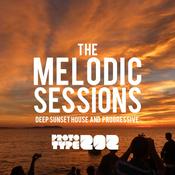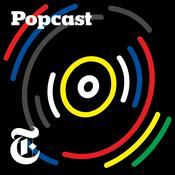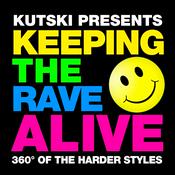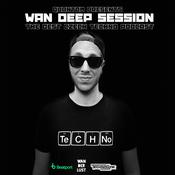Destroy! The influence of punk.
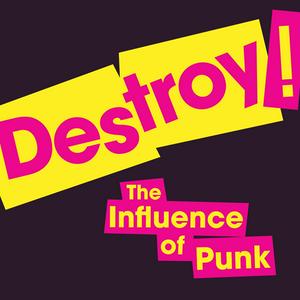
18 odcinków

"Vaughan Oliver: fond affections.” Pt II
26.06.2025 | 39 min.
“Fond affections are never said, they’re only sung in song.” (Michael Allen, Rema Rema)—Born in 1957 in County Durham, northeast England, British designer Vaughan Oliver stepped out of a world steeped in tradition and into the nonconformist realm of the music industry. Growing up in an environment devoid of culture, it was through Surrealism and Pop Art that he discovered modern art, its power to open up his imagination, and provide a doorway to new adventures rich with possibilities. Inspired by the work of record cover designer Roger Dean, he eventually found his calling at independent record label 4AD, where he worked with many of post-punk’s early pioneers: Cocteau Twins, Modern English, Colourbox, Lush, and of course This Mortal Coil.In 1982, with school friend and photographer Nigel Grierson, he founded the design studio 23 Envelope, which quickly became a center for creative innovation and revolution. In 1988, after Oliver and Grierson decided to part ways, Oliver went on to establish V23, fostering creative relationships with a new band of like-minded revolutionaries such as Chris Bigg and Simon Larbalestier, whose collaboration on the Pixies' Minotaur box set would earn them all a Grammy in 2010.The studio’s work also expanded into TV and film, but Oliver was always at his most content sitting down with a group of students, talking about ideas and football. He was a generous man, a loving father, a dedicated teacher, and an inspiration for generations of designers and musicians. After he died in 2019 at age 62, his legacy continued through his wife, Lee, who helped establish the Vaughan Oliver Graphic Design Scholarship program with Northumbria University and 4AD in 2021.Vaughan Oliver was a man of vast cerebral intellect with an impeccable sense of comedic timing. His life’s work was a poetic journey through sight and sound, and his impact on art and culture is still being felt today.This isn’t a biography. It’s a collage. Of images, of memory, of fond affections. The kind you can’t always say out loud—but you never forget.Featuring interviews with: Simon Raymonde, musician, founder Bella Union records; Paul West, artist and designer, founder Form; Tim O’Donnell, designer; Tom Murray, filmmaker and musician, founder Tulipomania; Adrian Shaughnessy, author, designer, publisher; Miki Berenyi, songwriter and musician, founder Lush and MB3; Graham Wood, art director and designer, founder Tomato; Jonathan Barnbrook, designer; Chris Bigg, designer. Archival audio: Vaughan Oliver, designer; Nigel Grierson, photographer; Ivo Watts-Russell, founder 4AD Records. Additional contributions from: Malcolm Garrett, designer, founder Assorted iMages; Neville Brody, designer, founder Brody Associates. And with generous support from Lee Widdows, art director, trend consultant, School Academic Lead UCA, Epsom, and keeper of the light.-Follow us on Instagram @destroypunkpodcast for the latest updates. Or visit us online: https://destroypunkpodcast.com for transcripts, show notes, and more.

"Vaughan Oliver: fond affections." Pt I
26.06.2025 | 44 min.
“Fond affections are never said, they’re only sung in song.” (Michael Allen, Rema Rema)—Born in 1957 in County Durham, northeast England, British designer Vaughan Oliver stepped out of a world steeped in tradition and into the nonconformist realm of the music industry. Growing up in an environment devoid of culture, it was through Surrealism and Pop Art that he discovered modern art, its power to open up his imagination, and provide a doorway to new adventures rich with possibilities. Inspired by the work of record cover designer Roger Dean, he eventually found his calling at independent record label 4AD, where he worked with many of post-punk’s early pioneers: Cocteau Twins, Modern English, Colourbox, Lush, and of course This Mortal Coil.In 1982, with school friend and photographer Nigel Grierson, he founded the design studio 23 Envelope, which quickly became a center for creative innovation and revolution. In 1988, after Oliver and Grierson decided to part ways, Oliver went on to establish V23, fostering creative relationships with a new band of like-minded revolutionaries such as Chris Bigg and Simon Larbalestier, whose collaboration on the Pixies' Minotaur box set would earn them all a Grammy in 2010.The studio’s work also expanded into TV and film, but Oliver was always at his most content sitting down with a group of students, talking about ideas and football. He was a generous man, a loving father, a dedicated teacher, and an inspiration for generations of designers and musicians. After he died in 2019 at age 62, his legacy continued through his wife, Lee, who helped establish the Vaughan Oliver Graphic Design Scholarship program with Northumbria University and 4AD in 2021.Vaughan Oliver was a man of vast cerebral intellect with an impeccable sense of comedic timing. His life’s work was a poetic journey through sight and sound, and his impact on art and culture is still being felt today.This isn’t a biography. It’s a collage. Of images, of memory, of fond affections. The kind you can’t always say out loud—but you never forget.Featuring interviews with: Simon Raymonde, musician, founder Bella Union records; Paul West, artist and designer, founder Form; Tim O’Donnell, designer; Tom Murray, filmmaker and musician, founder Tulipomania; Adrian Shaughnessy, author, designer, publisher; Miki Berenyi, songwriter and musician, founder Lush and MB3; Graham Wood, art director and designer, founder Tomato; Jonathan Barnbrook, designer; Chris Bigg, designer. Archival audio: Vaughan Oliver, designer; Nigel Grierson, photographer; Ivo Watts-Russell, founder 4AD Records. Additional contributions from: Malcolm Garrett, designer, founder Assorted iMages; Neville Brody, designer, founder Brody Associates. And with generous support from Lee Widdows, art director, trend consultant, School Academic Lead UCA, Epsom, and keeper of the light.-Follow us on Instagram @destroypunkpodcast for the latest updates. Or visit us online: https://destroypunkpodcast.com for transcripts, show notes, and more.

"Legs McNeil: Armagideon time."
30.04.2025 | 29 min.
Legs McNeil didn’t just witness punk’s birth, he helped name it. From the chaos of late ’70s New York, McNeil carved out a space for misfits, outsiders, and anyone who didn’t fit the mold. As the co-founder of Punk magazine, he gave voice to the subculture, capturing its raw defiance and shaping its legacy in ways no one could have predicted.In this episode, we trace McNeil’s journey from Connecticut to New York City, where he collided with the anarchic energy of CBGBs and the raw force of bands like The Ramones. His magazine wasn’t just about music, it was a declaration of war against the establishment. “I never thought what I did was shocking, I just thought it was normal.” (Legs McNeil)But McNeil’s story isn’t just about punk. His curiosity took him into worlds few would dare enter, the criminal underworld and the adult film industry. In this episode, we discuss how he went from punk provocateur to chronicler of outsiders, writing The Other Hollywood, a raw, uncensored oral history of the porn industry, and uncovering the dark truths behind Frank Lucas and the infamous American Gangster story.“I’ve always wanted to understand the things most people don’t want to see.” (Legs McNeil)Through his unflinching gaze, he found humanity in the shadows. McNeil’s journey is about more than rebellion; it’s about understanding the unseen, listening where others turn away, and finding truth in the chaos.-Follow us on Instagram @destroypunkpodcast for the latest updates. Or visit us online: https://destroypunkpodcast.com for transcripts, show notes, and more.

“Spizz: the final frontier.”
14.04.2025 | 49 min.
As a punk provocateur, design obsessive, and relentless shape-shifter, Spizz emerged from the chaos of late ’70s Britain with a DIY ethos and a sci-fi imagination that still defies categorization. He’s never fit the mold, not as a punk frontman, not as a designer, not even as a radio host.In this episode, we trace his wild trajectory: from gatecrashing the Birmingham Punk Festival to supporting Siouxsie and the Banshees, from four John Peel sessions to touring with the Human League, and designing record sleeves, fonts, and alter-egos along the way. “I saw The Clash and thought, I want some of that… I blagged my way on stage and just made it all up.” (Spizz)Over the decades, he’s played Wembley and the Marquee, written Star Trek musical trilogies, and used monikers like SpizzOrwell to collapse past, present, and future into one surreal performance.A relentless shape-shifter, we talk about Bowie and Orwell, about rebellion and surveillance, about fandom, identity, and why he’s still remixing the future in his 60s, broadcasting from the edge of tomorrow, hosting Spizz FM, generating AI musical experimentations, and performing acoustic sets as Spizzology – proof he’s still a cult figure with extraterrestrial ambitions.-Follow us on Instagram @destroypunkpodcast for the latest updates. Or visit us online: https://destroypunkpodcast.com for transcripts, show notes, and more.

“Jon Savage: resistance is not futile.”
31.03.2025 | 24 min.
Jon Savage’s journey into the heart of youth culture began at Cambridge University, where he turned his back on a career in law to pursue his passion for music and cultural criticism. From his early days writing fanzines in the 1970s to his influential roles at Sounds and Melody Maker, Savage became a defining voice in the world of punk and beyond. His landmark book England’s Dreaming captured the essence of punk, which, for Savage, was never just a genre, it was a cultural movement that challenged the status quo and created a space for personal expression and rebellion.In his latest book, The Secret Public, Savage explores the transformative power of LGBTQ+ resistance in popular culture and delves into how groundbreaking artists like Little Richard and David Bowie used their music and public personas not just to break taboos but to redefine the very concept of identity, carving out new spaces for self-expression, leaving a lasting impact on music and culture.Savage’s place in the history of music journalism is firmly established, and his passion for music and its power to affect change has never waned. To this day he sees punk’s DIY ethos as still offering a framework for artists to create and express themselves on their terms, despite the overwhelming influence of corporate interests in the modern music industry.“Punk was about doing things for yourself—if you want to say something, play an instrument, or write, then just do it. That’s the most important lesson it left us.” (Jon Savage)Savage continues to write and contribute to publications like The Guardian and Mojo, offering fresh insights into the intersections of music, culture, and politics. His work remains vital in understanding the cultural forces shaping our world, whether through his writing, public lectures, or interviews.In this episode, Savage reflects on the lasting influence of punk, the changing media landscape, and the ongoing impact of artists like Bowie and Little Richard in reshaping societal norms.-Follow us on Instagram @destroypunkpodcast for the latest updates. Or visit us online: https://destroypunkpodcast.com for transcripts, show notes, and more.
Więcej Muzyka podcastów
Trendy w podcaście Muzyka
O Destroy! The influence of punk.
Słuchaj Destroy! The influence of punk., Podcast i wielu innych podcastów z całego świata dzięki aplikacji radio.pl

Uzyskaj bezpłatną aplikację radio.pl
- Stacje i podcasty do zakładek
- Strumieniuj przez Wi-Fi lub Bluetooth
- Obsługuje Carplay & Android Auto
- Jeszcze więcej funkcjonalności
Uzyskaj bezpłatną aplikację radio.pl
- Stacje i podcasty do zakładek
- Strumieniuj przez Wi-Fi lub Bluetooth
- Obsługuje Carplay & Android Auto
- Jeszcze więcej funkcjonalności


Destroy! The influence of punk.
pobierz aplikację,
zacznij słuchać.




